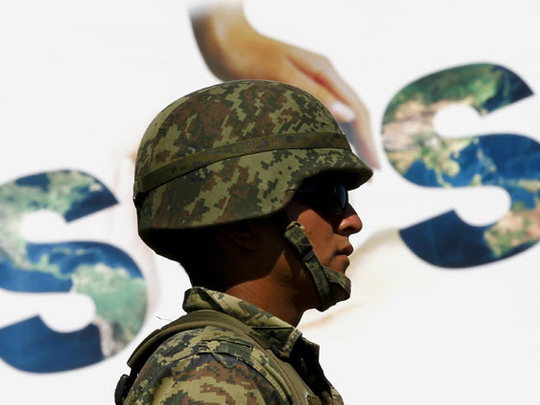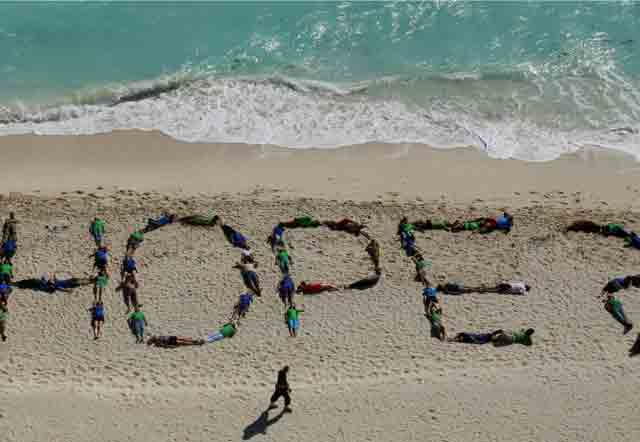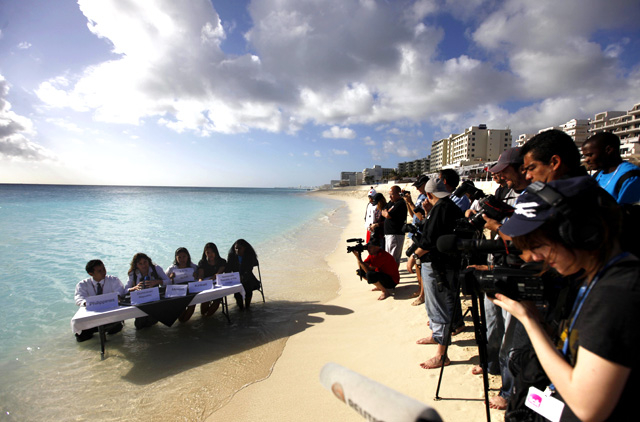
Cancun: A United Nation conference on Saturday adopted a modest climate deal creating a fund to help the developing world go green, though it deferred for another year the task of carving out deeper reductions in carbon emissions.
The deal includes setting up a Green Climate Fund to give $100 billion (Dh367 billion) a year in aid for poor countries by 2020, measures to protect tropical forests and ways to share clean energy technologies.
It is the first time in three years that the 193-nation conference adopted any climate action, restoring faith in the unwieldy UN process after the letdown a year ago at Copenhagen.
The conference overrode a lone objection by Bolivia, which argued the plan did not do enough to combat climate change.
The Cancun Agreements create institutions for delivering technology and funding to poorer countries, but do not say where the funding will come from.
In urging industrial countries to move faster on emissions cuts, the Cancun Conference "recognised" the goal recommended by scientists to reduce greenhouse gas emissions from industrial countries by 25 to 40 per cent from 1990 levels within the next 10 years. Current pledges amount to about 16 per cent.
Mexican President Felipe Calderon declared the conference "a thoroughgoing success". The agreements shattered "the inertia of mistrust" that had settled over the frustrated efforts for a broad climate treaty, he said.
The talks involving more than 190 nations approved early Saturday an agreement that calls for consideration of another round of the landmark Kyoto Protocol, the first part of a deal that also includes setting up a climate aid fund.
Bolivia was virtually alone in rejecting the deal, saying that it was too timid. But Mexican Foreign Secretary Patricia Espinosa overruled the Bolivian negotiator who repeatedly took the floor and insisted the deal needed complete consensus.
"The rule of consensus doesn't mean unanimity, and even less the possibility that a delegation can expect to impose a right of veto on the will that has been reached by so much work," Espinosa said to applause from the two-week conference.
The Bolivian negotiator, Pedro Solon, threatened to look at the legality of the decision.
"This text does not represent a step forward, it represents a step backward," he said, arguing that the deal does little to meet the goal of checking the rise in temperatures to 2 degrees Celsius.
Earlier, the United States, China and dozens of other countries rallied around the plan to slow global warming at climate talks on Friday, with Bolivia alone in condemning a deal that needs support from all to succeed.
Many environment ministers, nearing the end of two weeks of talks among almost 200 nations, praised a proposal by Mexico to break an impasse between rich and poor countries about greenhouse gas cuts by rich nations under the Kyoto Protocol.
The proposed deal does not include a commitment to extend Kyoto beyond 2012, when it is due to expire, but it would prevent a collapse of climate change negotiations and allow for some modest advances on protecting the environment.
They include setting up a new "Green Climate Fund" to help the world's least developed countries, payments to protect tropical forests, and another agreement to share low carbon technologies.
"What we have now is a text that is not perfect but is certainly a good basis for moving forward," said U.S. climate envoy Todd Stern.
Xie Zhenhua, China's chief delegate at the talks in Mexico's Caribbean beach resort of Cancun, said Beijing supported the proposal: "While there are some shortcomings, we express our satisfaction with it."
China and the United States are the world's top emitters of greenhouse gases.
Other big emitters including the European Union, India and Japan, as well as many developing nations, also backed the deal that would effectively put off a dispute between rich and poor countries about the future of Kyoto until next year.
But Bolivia dismissed the proposed pact as inadequate, and it could derail the talks if it sticks to its guns because any deal under the U.N.-led negotiations needs unanimous support.
"Bolivia is not prepared to sign a document which means an increase of the average temperature, which will put more people close to death," Bolivia's delegate Pablo Solon said.
Bolivia has the toughest demands of any nation at the talks, demanding that rich nations halve their greenhouse gas emissions by 2017 from 1990 levels. President Evo Morales told the meeting earlier this week that the climate policies of rich nations were causing "genocide."
His left-wing government will likely come under heavy pressure to agree to the proposed deal at Cancun.
Negotiators here hope that by staving off a crisis over Kyoto and agreeing other measures to limit the impact of climate change, they will help reduce the danger of floods, droughts, heat waves and rising sea levels.
Kyoto dispute
The talks had earlier been deadlocked after Japan, Russia and Canada said they did not want to extend the Kyoto Protocol, which only obliges about 40 rich countries to cut greenhouse gas emissions, and only does so until 2012.
They instead want a new, wider U.N. treaty in coming years that includes binding emissions targets for other countries, including China, the United States and India.
Developing countries respond by saying that richer nations bear most responsibility for global warming and so must lead the way on cutting emissions by extending Kyoto without forcing others into emissions targets that would limit their ability to spur economic growth and tackle poverty.
As it is, developing nations are expected to only slow the rise of their emissions in coming years, not cut them.
The United States never ratified Kyoto. Former President George W. Bush said it would cost US jobs and complained it let China and other emerging economic powerhouses off too lightly.
The Cancun talks are trying to rebuild trust between rich and poor nations after President Barack Obama and other leaders failed last year to agree a treaty at a summit in Copenhagen.
The draft agreement welcomed by many delegates on Friday night refers vaguely to "a second commitment period" for Kyoto, meaning its future would be decided in further negotiations over the next two years.
Countries backing the draft won applause while Bolivia's Solon was met by silence when he slammed it.
Venezuela and Nicaragua, both socialist allies of Bolivia, urged more consultations over its objections.
The Kyoto Protocol currently obliges almost 40 developed nations to cut emissions by an average of 5.2 percent below 1990 levels from 2008 to 2012.
The negotiations in Cancun have seen only sporadic protests but a scuffle broke out on Friday with a group of environmental activists outside a main conference hall.
The Copenhagen summit collapsed in acrimony, producing only a nonbinding accord to limit a rise in temperatures to below 2 degrees Celsius (3.6 F) above pre-industrial times.
How significant do you think the deal in Cancun is in combating climate change? Will this agreement set a good precedent for stronger moves in the future?















